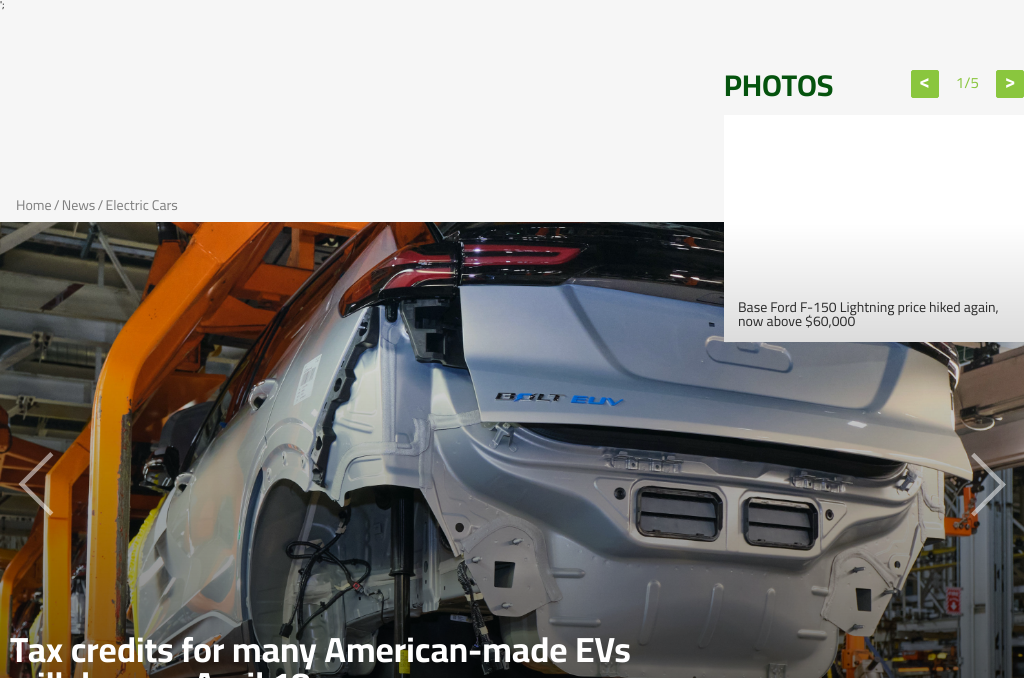The US Treasury Department has issued updated guidance for electric vehicles (EVs) eligible for the federal $7,500 EV tax credit under the Inflation Reduction Act (IRA) signed by President Biden last year.[0] The new rules, taking effect from April 18th, outline requirements for critical minerals and battery components automakers must use in EV batteries to ensure eligibility for the full credit. Batteries for EVs must meet a “critical mineral requirement” to be eligible for $3,750 of the tax credit. To qualify for the tax credit on a vehicle bought in 2023, the battery must contain minerals extracted or processed in the U.S. or in a country that has a free trade agreement with the U.S., accounting for 40% of its composition. The percentage requirement will increase gradually to 80% by 2027.[1]
The rules also state that batteries can’t contain critical materials sourced from a foreign entity of concern, including China, Iran, North Korea, and Russia. Starting in 2024, none of the battery can be manufactured in a “foreign entity of concern,” and in 2025, none of the minerals can be sourced from those specific countries. After 2024, batteries must contain no components whatsoever that were manufactured or assembled by a “foreign entity of concern” (FEOC), and after 2025, no critical minerals can be extracted, processed, or recycled by a FEOC.
Manufacturers must guarantee that battery essential minerals are either extracted or processed within the United States or in a country that has a free trade agreement with the US, or recycled within North America to comply with IRA regulations. It is imperative that they guarantee the manufacturing or assembly of battery components takes place in North America.[2] The new criteria will take effect on April 18th, when a list of qualifying models is expected to be published.[3] Until then, car buyers can claim the full tax credit when they buy vehicles that are currently eligible and before more are expected to drop off the list.[3]
However, the new guidelines add more confusion than clarity, and it’s evident that fewer EVs will be eligible for the tax credit.[4] The eligibility of certain EV models for partial credits after the deadline remains uncertain.[5] “Given the constraints of the legislation, Treasury’s done as well as it could to produce rules that meet the statute and reflect the current market,” said John Bozzella, president and CEO of the Alliance for Automotive Innovation.[6] He also noted that fewer vehicles (and fewer customers) will qualify for the full $7,500 credit in the near term.
One major drawback of the new rule is that several vehicles that currently qualify for the credit will no longer be eligible for the full $7,500 tax break. For example, Tesla acknowledged that it would lose the full tax credit on a variant of the Model 3 since the battery is sourced from China.[7] The credit is applicable to a minimum of three variants of Tesla’s Model 3 and Model Y.[8] At present, numerous automobile manufacturers have come to terms with the reality that they are forfeiting the tax credit.[3]
The new rules will reduce or eliminate credits on some zero-emission models, and automakers see the $7,500-per-vehicle incentive as a tool for achieving Biden’s goal of having electric cars and trucks make up half of all new vehicle sales by 2030.[9] Expanding the eligibility criteria for tax incentives to encompass a wider range of vehicles could also fulfill Biden’s commitment to assist consumers in making electric cars more cost-effective.[10] The new sourcing requirements will reduce or eliminate credits on some zero-emission models, and automakers are eagerly awaiting the Treasury guidance.[11]
The supply chain for EV batteries has historically been dominated by China, and while companies are racing to build mines and battery plants in the U.S., it will take years for those efforts to pay off.[6] The minerals and components needed for batteries are simply not yet made in large quantities in the U.S., making it unlikely that many (if any) US-made EVs will qualify for the full credit, at least for now.[12]
0. “Everything you need to know about the IRS’s new EV tax credit guidance” Electrek, 31 Mar. 2023, https://electrek.co/2023/03/31/everything-you-need-to-know-about-irs-new-ev-tax-credit-guidance/
1. “New EV Tax Credit Rules Mean Fewer Discounts For Car Shoppers” Forbes, 31 Mar. 2023, https://www.forbes.com/wheels/news/ev-tax-credit-rules-battery-components/
2. “Tax credits for many American-made EVs will drop on April 18” Green Car Reports, 31 Mar. 2023, https://www.greencarreports.com/news/1139218_tax-credits-for-many-american-made-evs-will-drop-on-april-18
3. “Fewer EVs will qualify for the federal $7500 tax credit under updated rules” The Verge, 31 Mar. 2023, https://www.theverge.com/2023/3/31/23664636/federal-ev-tax-credit-vehicles-qualify-eligible-battery-china
4. “Automakers are resigned. Manchin is furious. Europe has to wait.” POLITICO, 31 Mar. 2023, https://www.politico.com/news/2023/03/31/manchin-electric-vehicles-tax-credits-00089700
5. “Stricter guidance means fewer EVs will qualify for $7,500 federal tax credit” Engadget, 31 Mar. 2023, https://www.engadget.com/stricter-guidance-means-fewer-evs-will-qualify-for-7500-federal-tax-credit-180350889.html
6. “How the $7,500 tax credit to buy an electric car is about to change yet again” Oregon Public Broadcasting, 31 Mar. 2023, https://www.opb.org/article/2023/03/31/how-the-7500-tax-credit-to-buy-an-electric-car-is-about-to-change-yet-again
7. “IRS updates IRA EV tax credit guidance, new rules apply April 18” TESLARATI, 31 Mar. 2023, https://www.teslarati.com/irs-ira-ev-tax-credit-guidance-rules-april-18/
8. “EV tax credit likely to get updated with proposed battery source requirements” CBS News, 31 Mar. 2023, https://www.cbsnews.com/news/ev-tax-credit-updated-battery-source-requirements
9. “Electric Vehicle Tax Credits: Few Models Qualify to Spark US Manufacturing” Bloomberg, 31 Mar. 2023, https://www.bloomberg.com/news/articles/2023-03-31/biden-makes-ev-credits-elusive-in-bid-for-us-auto-renaissance
10. “U.S. eyeing ways to include Europe in electric car tax breaks” POLITICO, 24 Mar. 2023, https://www.politico.com/news/2023/03/24/biden-electric-vehicle-subsidies-eu-00088757
11. “U.S. Unveils Supply Chain Requirements For EV Tax Credits” OilPrice.com, 31 Mar. 2023, https://oilprice.com/Latest-Energy-News/World-News/US-Unveils-Supply-Chain-Requirements-For-EV-Tax-Credits.html
12. “US EV Tax Credit Rules Officially Change April 18, 2023” InsideEVs , 31 Mar. 2023, https://insideevs.com/news/660135/us-ev-tax-credit-rules-change-april-18-2023/
